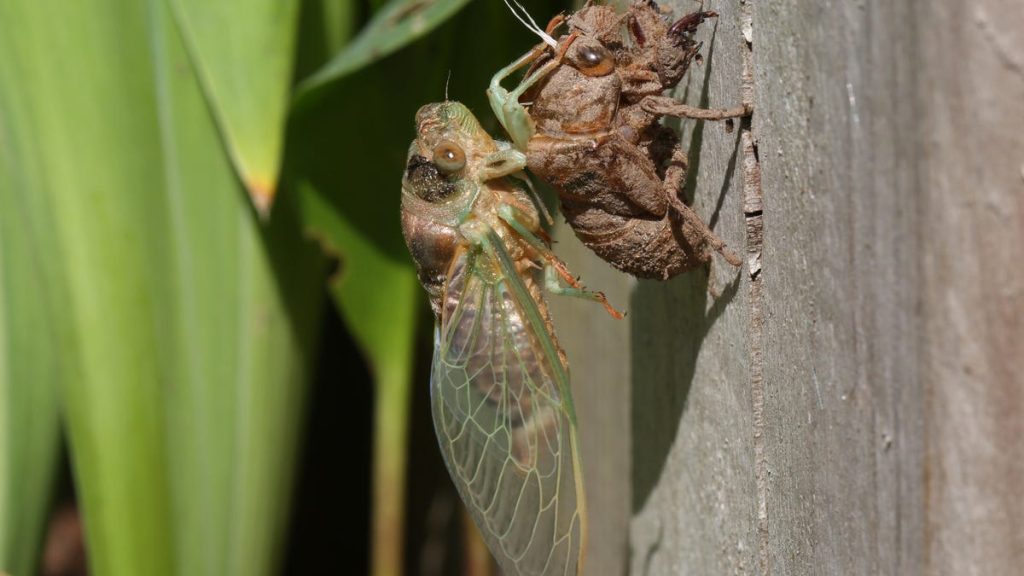My dog has a strange addiction to eating cicadas, which she has been doing every summer for the five years of her life, resulting in her throwing them up, dead and alive, in the living room. Due to this behavior, she is not allowed outside during cicada season without supervision. This habit, while unusual, is actually quite common among dogs, especially during cicada season. The upcoming double emergence of Brood XIX and Brood XIII is expected to be one of the largest cicada emergences in recent years, affecting many states in the US. While cicadas are not poisonous or dangerous for dogs to eat, excessive consumption can lead to gastrointestinal issues and potentially blockages. It is important to monitor your pet’s behavior and seek veterinary assistance if any concerning symptoms occur.
The double emergence of Brood XIX and Brood XIII this year is a rare occurrence, with the last double emergence happening in 1803. Both broods will be emerging in May, with the Great Southern Brood emerging every 13 years and the Northern Illinois Brood on a 17-year cycle. This will result in cicadas taking over 17 states from May to mid-June, creating a spectacle for residents in those areas. While cicadas are not harmful to dogs, excessive consumption can lead to gastrointestinal issues and potential blockages. It is essential to monitor your pet’s behavior for any abnormal signs and seek veterinary assistance if needed.
Experts advise pet owners to be cautious about their dogs consuming cicadas, as the shells can cause gastrointestinal irritation and potential blockages. While cicadas themselves are not poisonous or dangerous, excessive consumption can lead to health issues for dogs. Symptoms to watch for include depression, lethargy, excessive salivation, and repeated vomiting. If these symptoms occur, it is recommended to seek veterinary care for your pet. In the event that a dog shows concerning symptoms after consuming cicadas, such as being unable to hold water down, veterinary assistance should be sought to ensure the pet’s well-being.
While cicadas themselves are not harmful or venomous, pet owners should be cautious about their dogs consuming them in excess, as it can lead to gastrointestinal issues and potential blockages. It is important to monitor your pet’s behavior for any abnormal signs after consuming cicadas, such as depression, lethargy, excessive salivation, and repeated vomiting. If any concerning symptoms occur, it is recommended to seek veterinary care for your pet to ensure their well-being. Observing your pet for any changes in behavior and seeking veterinary assistance if needed can help prevent any complications from the consumption of cicadas during the upcoming season.
The upcoming emergence of Brood XIX and Brood XIII is expected to be one of the largest cicada emergences in recent years, affecting multiple states in the US. While cicadas are not harmful or poisonous to dogs, excessive consumption can lead to gastrointestinal issues and potential blockages. It is crucial for pet owners to monitor their dogs’ behavior for any abnormal signs after consuming cicadas, such as depression, lethargy, excessive salivation, and repeated vomiting. Seeking veterinary assistance if any concerning symptoms occur can help ensure the well-being of pets during the cicada season.
Overall, while cicadas are not poisonous or harmful to dogs, excessive consumption can lead to gastrointestinal issues and potential blockages. It is essential for pet owners to monitor their dogs for any abnormal behavior after consuming cicadas, such as depression, lethargy, excessive salivation, and repeated vomiting. Seeking veterinary care if any concerning symptoms occur can help ensure the well-being of pets during the upcoming cicada season. By being cautious and aware of the potential risks of excessive cicada consumption, pet owners can help keep their dogs safe and healthy during this unique period of cicada emergence.












